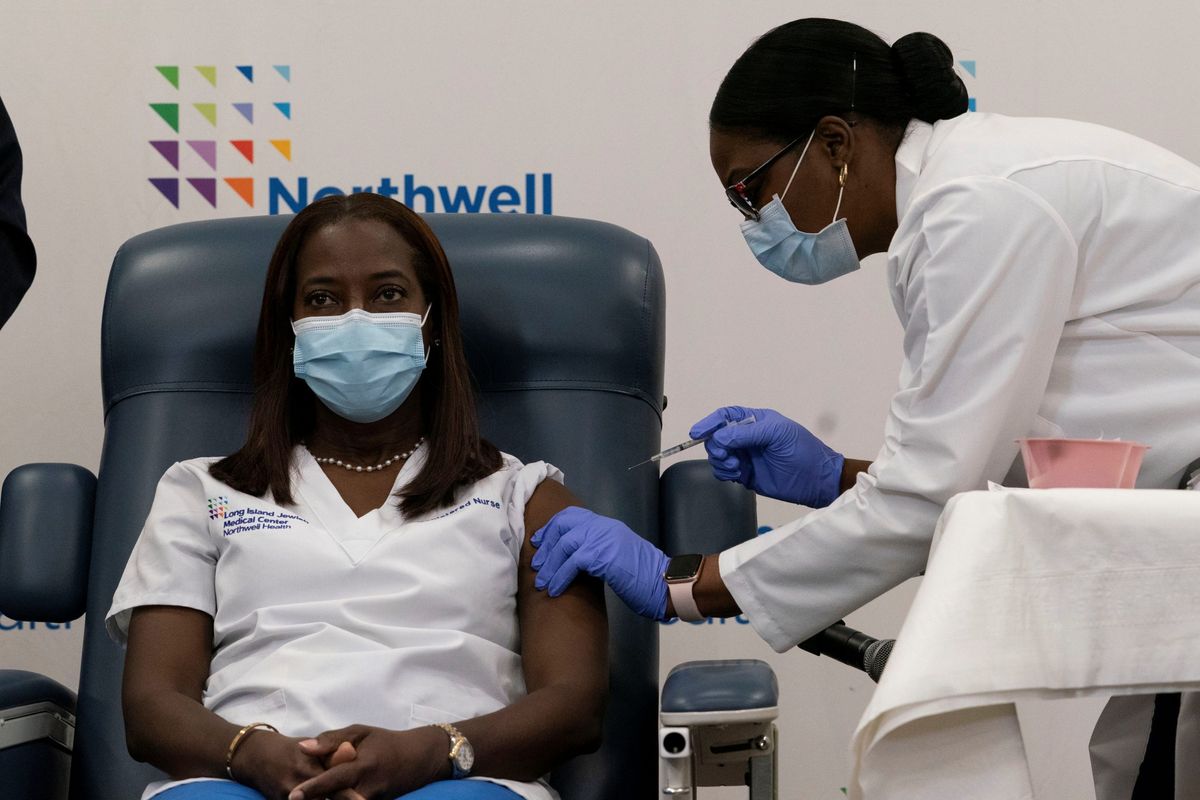Why are Black Americans skeptical of the coronavirus vaccine?

A few minutes every morning is all you need.
Stay up to date on the world's Headlines and Human Stories. It's fun, it's factual, it's fluff-free.
Only 42% of Black Americans have said that they would take the vaccine. In contrast, 63% of Hispanics and 61% of white adults say they plan on taking the vaccine when it becomes available.
On Monday, December 15, 2020, the first publicized vaccine in the United States was given to Sandra Lindsay, a critical care nurse who works in New York City.
The vaccine was received and administered by Black American women, a symbol meant to establish confidence in the vaccine among Americans. Despite backing from the Food and Drug Administration (FDA) and successful clinical trials, many Americans are still skeptical of a vaccine administered by the government, with a majority of Black Americans saying they wouldn’t take the vaccine.
For a community that has seen a disproportionate number of coronavirus cases and deaths, skepticism over a new vaccine produced by Pfizer and Moderna remains strong among people of color in the US.
Worrying statistics
Though the National Institutes of Health (NIH) has mandated the inclusion of women and minority groups in federally funded research, studies have shown that Black Americans participate less frequently than whites.
In a survey released by the Pew Research Group, only 42% of Black Americans have said that they would take the coronavirus vaccine. In contrast, 63% of Hispanics and 61% of white adults say they plan on taking the vaccine when it becomes available. The comparatively low response rate among Black Americans is startling when compared to the disparities among those who have contracted or died from the coronavirus, with 71% of Black Americans reporting knowing someone who has been hospitalized or died because of COVID-19.
Experimentation and forced sterilization
The 1932 Tuskegee syphilis study is widely attributed as the main reason why Black Americans are so skeptical of government-mandated vaccines. The study included 600 Black men, 399 of them diagnosed with syphilis. The men were promised medical examinations, free meals, and burial insurance for their participation in the study.
Originally, the study was meant to last for six years. Instead, it lasted for 40. Despite the discovery of penicillin and its wide use in the late 1940s, the men in the study were given placebos, aspirin and mineral supplements as treatment.
The doctors’ aim was to study the complete progression of the disease, so the real treatment was never given to the men in the study. Because these men never received proper care, they eventually died, went blind, went insane, or suffered from severe health issues. Additionally, the children of these men also contracted the disease, which continued to go untreated.
The surviving participants and the heirs of those who died received US$10 million in an out-of-court settlement. In 1997, President Bill Clinton formally apologized on behalf of the American people.
“People throw around the word ‘Tuskegee’ all the time. I see a lot of conflation with that,” Dr. Michelle Ogunwole, a health disparities researcher, epidemiologist, and general internal medicine physician, told TMS. “It’s all true, and they are valid for saying that, but they’re not really understanding the history of those who lived through it. Tuskegee was a horrible incident in American history, but a large part of the unethical part of Tuskegee was the refusal to give treatment, which is very different from what we see today.”
The American medical community’s troubled history of experimentation on Black, Indigenous, and People of Color (BIPOC) begins far before the Tuskegee study, all based on the dehumanization of Black Americans.
J. Marion Sims, known as the “father of gynecology” experimented on six slave women. Over four years, Sims conducted experimental surgeries to create a cure for vesicovaginal fistula, an opening in the bladder wall of the vagina. One of his patients, Lucy, was treated for over an hour while Sims tried to repair her vesicovaginal fistula without anesthesia. Sims wrote, “Lucy’s agony was extreme. I thought she was going to die.” She survived, but also suffered blood poisoning due to his experiments.
Other medical atrocities include contraception coercion, forced sterilization, medical abuse and malpractice, and eugenic movements. But the medical profession continues to mistreat Black Americans today.
In 2018, a report by the US Department of Health and Human Services measured over 250 areas of structure, process, and outcome. The report found that there remain strong disparities, especially in poor and uninsured populations. “Blacks, American Indians and Alaska Natives (AI/ANs), and Native Hawaiians/Pacific Islanders (NHPIs) received worse care than Whites for about 40% of quality measures.”
Trust through truth and transparency – not coercion
Dr. Ogunwole told TMS that the disparity within the medical field cannot be fixed in the several months before the vaccine is available for public use. “The younger generation, so people in their early twenties, have been clinging on to this mistrust in the health care system especially among Black people,” she said. “The medical system has a history of devaluing Black bodies.” This distrust has passed from generation to generation and it isn’t something that can be fixed so easily.
Dr. Luz Claudio, professor of Public Health at Icahn School of Medicine at Mount Sinai in New York City, has found that people of color would be willing to participate in clinical research depending on who suggested it.
“People in our study tended to trust the research if the outreach was done by their own doctors, especially if those doctors were people of color themselves,” she told TMS. “This has important implications in the distribution of the coronavirus vaccine in communities that have been most impacted by this pandemic and implies that we will need more health care and research workers who are people of color and also are from the communities that are most impacted.”
Dr. Ogunwole offered similar sentiments about solidifying confidence in the vaccine. “People seeing us do it, normalizing it, my husband is a Black physician as well. He posted a picture on Facebook to show that he got it,” she explained. “It’s going to take multiple approaches. One of them is getting a vaccine and posting, taking a diary of symptoms everyday, trying to be as transparent as possible, those are some of the things that some of my Black physician colleagues have committed to.”
She also believes that it will take more than physicians to convince others. It will take “trusted community partners like barbers and beauty shops that are well known in the community” to spread awareness and encourage others that the vaccine is safe.
Most importantly, Dr. Ogunwole believes administering the vaccine should be approached through “truth, transparency, and no coercion.”
“I’m not trying to convince people that the system is going to wake up and tomorrow they won’t be racist anymore, and that’s why you should take the vaccine,” She added. “That’s just not true. I think the issue is that our communities are dying at disproportionate rates, and I don’t want them to die anymore.”
Have a tip or story? Get in touch with our reporters at tips@themilsource.com




Comments ()